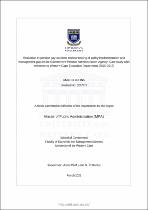| dc.description.abstract | The study aims to investigate whether delays occur within the pipeline of pension pay-outs,
where these delays occur and what the policy implementations and management gaps are
within the pension administration system. The study intends to produce findings that assist in
reducing the aforementioned delays and increasing efficiency. The specific objectives of the
study are threefold. Firstly, the study intends to outline the Government Pension
Administration Agency’s (GPAA) current policy and pipeline of procedures with specific
reference to pension pay-out times. Secondly, it will identify pension pay-out delays and trends
with reference to categories and periods of delay. Finally, it will identify the major areas of
complaints, pipeline problems and constraints.
The methodology used is both a qualitative document analysis (QDA) and a descriptive
analysis of the data. It is appropriate, suitable, cost-effective and common for desktop research.
The corroboration of findings and confluence of evidence give credibility and thus
triangulation of information is of immense value. The limitation of methodology, findings and
results is specific to the Western Cape Education Department (WCED) which is the largest
employer in the Western Cape Province.
This study found that the Government Employees Pension Fund (GEPF) and the GPAA
adopted New Public Management (NPM) values and strategies. Furthermore, pension pay-outs
exceeding 60 days have been reduced when compared to the period prior to modernisation in
2010. Despite this, delays in payment remain very high. Internal sources include the GEPF
Benefits Admin Committee; email and / or telephonic portals (GEPF Call Centre – reactive).
External sources include the Public Protector and the Presidential hotline. Finally, total interest
paid on late payments in 2010 was R1,054 billion and increased to R1,901 billion by 2017.
The implication of these findings is expected to be further reductions in waiting times, as
modernisation of the organisation continues. However, this cannot be a foregone conclusion
because it will depend on the management of implementation. | en_US |

